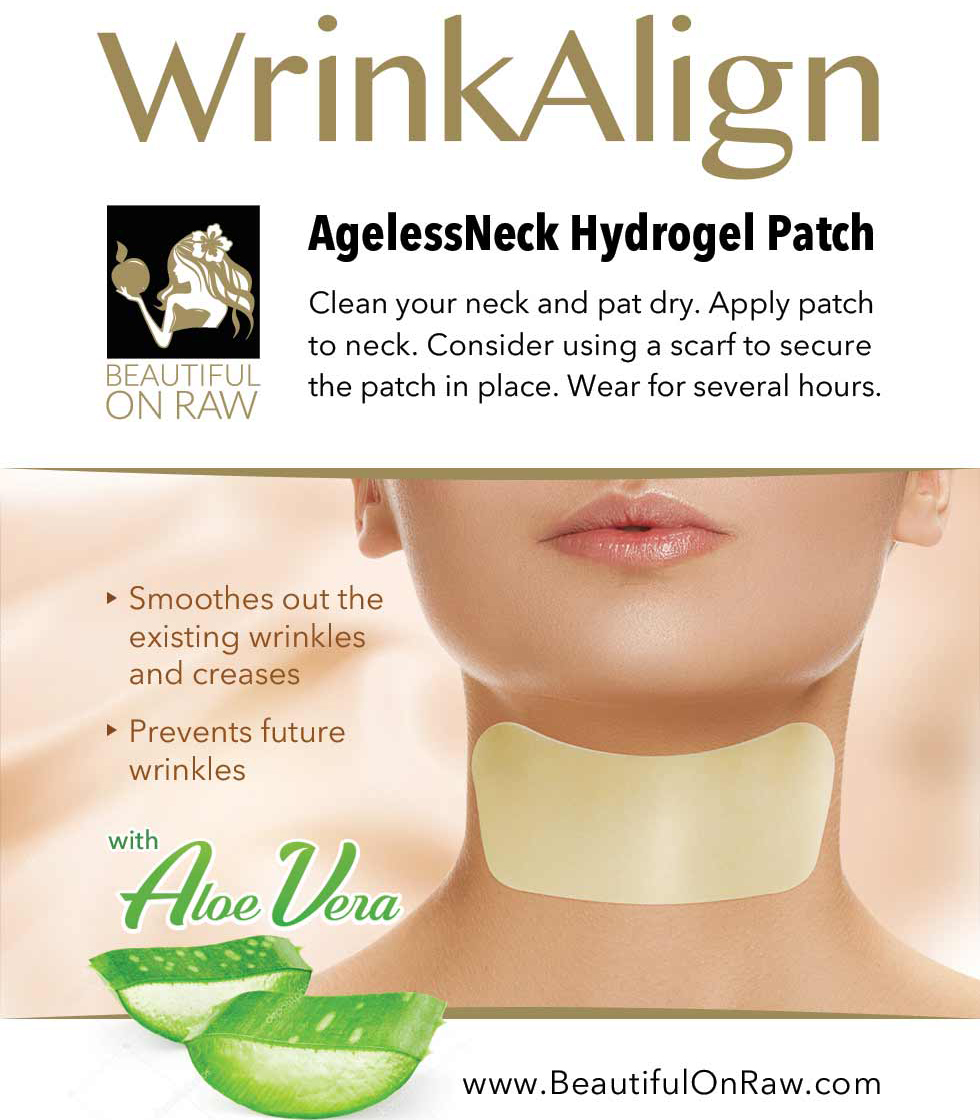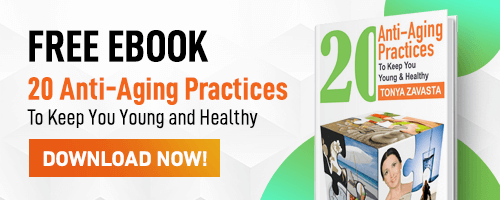Wrinkalign AgelessNeck Hydrogel... Ingredients

WrinkAlign Hydrogel AgelessNeck patches are used to help moisturize and firm the skin on the neck, as well as to reduce the appearance of fine lines and wrinkles.
Ingredients:
Water, glycerin, sodium Polyacrylate, PVP, aloe barbadensis extract (aloe vera), 1,2-hexanediol, Citric acid, niacimamide, Pantheon, tartaric acid, Tocopherol acetate, Disodium edta, per-40 hydrogenated castor oil, PEG-400, iodopropynyl butylcarbamate, sodium hyaluronate, beta-glucan, hydroxypropyl tetrahydropyrantriol, ologopeptide-1, acetyl hexapeptide-8
Here's an explanation for each ingredient:
Sodium polyacrylate is a polymer made from the monomer acrylic acid. It is an absorbent material. When it comes into contact with water, it can absorb up to 200-300 times its weight in water. Sodium polyacrylate is considered safe for use in consumer products. It has been extensively tested and is approved by regulatory agencies such as the US Food and Drug Administration (FDA) for use in food packaging and as an absorbent in food products.
PVP (Polyvinylpyrrolidone) is a water-soluble polymer that is widely used in cosmetic products. It is used primarily as a binder, film former, and thickener in cosmetic formulations. It has a long history of safe use in cosmetic and personal care products, and there is no evidence to suggest that it poses a risk to human health at typical levels of exposure. PVP is used as a thickener to provide a silky, smooth texture and to help control the viscosity of the formulation.
Aloe barbadensis extract (aloe vera) Aloe barbadensis extract, commonly known as aloe vera, is a plant-derived ingredient that is often used in cosmetics, personal care products, and medicinal products. Aloe vera is a succulent plant that is native to North Africa and the Arabian Peninsula but is now widely cultivated in many other regions.
Aloe vera extract is known for its moisturizing and soothing properties, which make it a popular ingredient in skincare products such as lotions, creams, and serums. It is also used in hair care products to help condition and nourish the hair.
In addition to its cosmetic uses, aloe vera extract has been traditionally used for its medicinal properties, particularly in the treatment of burns and skin irritations. It is also believed to have anti-inflammatory and anti-bacterial properties.
Overall, aloe vera extract is a versatile ingredient that can provide numerous benefits for the skin and hair, as well as having potential health benefits.
1,2-hexanediol is a colorless liquid with a slightly sweet odor that is used as a solvent to help dissolve other ingredients, as a humectant to help attract and retain moisture, and as a preservative booster to enhance the effectiveness of other preservatives. 1,2-hexanediol is considered to be a safe ingredient for use in cosmetic products, and its use is regulated by various government agencies to ensure its safety.
Niacinamide, also known as vitamin B3 or nicotinamide, is a water-soluble vitamin that is commonly used in cosmetics and skincare products due to its various benefits for the skin.
Niacinamide has been shown to have anti-inflammatory properties, help improve the skin barrier function, and reduce the appearance of hyperpigmentation, fine lines, and wrinkles.
Niacinamide has been extensively studied for its safety and is generally considered safe for use in cosmetics. It is well-tolerated by most people and has a low risk of causing irritation or allergic reactions.
Panthenol, also known as provitamin B5, is a water-soluble vitamin that is commonly used in cosmetics and skincare products due to its various benefits for the skin and hair.
Panthenol is a humectant, meaning it helps to attract and retain moisture in the skin, making it a popular ingredient in moisturizers, lotions, and creams. It also has soothing and anti-inflammatory properties, which can help to calm and soothe irritated skin.
Panthenol is generally considered safe for use in cosmetics and has been extensively studied for its safety. It has a low risk of causing irritation or allergic reactions and is well-tolerated by most people, including those with sensitive skin.
Tartaric acid is a naturally occurring organic acid that is commonly used in cosmetics and personal care products as a pH adjuster, antioxidant, and emulsifying agent. It is found in many fruits, including grapes, bananas, and tamarinds.
In cosmetics, tartaric acid is used in a variety of products, including cleansers, toners, and hair care products, to help maintain the pH balance of the skin or hair. It can also help to improve the texture and stability of emulsions and prevent oxidation of other ingredients.
Tartaric acid is generally considered safe for use in cosmetics and personal care products. It has been extensively studied for its safety and efficacy, and is approved for use by regulatory agencies such as the US Food and Drug Administration (FDA) and the European Union.
Tocopheryl acetate, also known as vitamin E acetate, is a form of vitamin E that is commonly used in cosmetics and personal care products as an antioxidant and skin conditioning agent. It is derived from natural sources, such as vegetable oils and wheat germ.
In cosmetics, tocopheryl acetate is used in a variety of products, including moisturizers, sunscreens, and anti-aging products, to help protect the skin from damage caused by free radicals and environmental stressors. It can also help to improve the texture and appearance of the skin by reducing the appearance of fine lines and wrinkles.
Tocopheryl acetate is generally considered safe for use in cosmetics and personal care products. It has been extensively studied for its safety and efficacy, and is approved for use by regulatory agencies such as the US Food and Drug Administration (FDA) and the European Union.
Disodium EDTA (ethylene diamine tetraacetic acid) is a chelating agent that is commonly used in cosmetics and personal care products to improve the stability and efficacy of a product.
Disodium EDTA is generally considered safe for use in cosmetics and has been extensively studied for its safety. It is approved for use in cosmetic and personal care products by regulatory agencies such as the US Food and Drug Administration (FDA) and the European Union.
PEG-400 (polyethylene glycol 400) is a water-soluble, low molecular weight polymer that is commonly used in cosmetics and personal care products as a solvent, emulsifier, and viscosity-enhancing agent.
In cosmetics, PEG-400 is often used as a base ingredient in creams, lotions, and other skincare products. It can help to improve the texture and spreadability of these products, as well as enhance their moisturizing properties.
PEG-400 is generally considered safe for use in cosmetics and personal care products. It has a low potential for skin irritation and is well-tolerated by most people, including those with sensitive skin.
Iodopropynyl butylcarbamate (IPBC) is a preservative that is used in cosmetics and personal care products to prevent the growth of bacteria, yeast, and fungi.
IPBC is a water-soluble, broad-spectrum preservative that is effective against a wide range of microorganisms. It is commonly used in leave-on and rinse-off cosmetics and personal care products, such as lotions, creams, shampoos, and conditioners.
IPBC is generally considered safe for use in cosmetics and personal care products at concentrations of up to 0.1%. It has been extensively studied for its safety and is approved for use by regulatory agencies such as the US Food and Drug Administration (FDA) and the European Union.
Sodium hyaluronate is a salt form of hyaluronic acid, which is a naturally occurring polysaccharide (sugar molecule) found in the human body. It is commonly used in cosmetics and personal care products for its hydrating and moisturizing properties.
In cosmetics, sodium hyaluronate is used to improve the texture and appearance of the skin by helping to retain moisture and improve elasticity.
Sodium hyaluronate is generally considered safe for use in cosmetics and personal care products. It is a naturally occurring substance in the body and is well-tolerated by most people, including those with sensitive skin.
Beta-glucan is a type of soluble fiber that is found in various natural sources, including oats, barley, and some types of mushrooms. It is commonly used in cosmetics and personal care products for its anti-inflammatory and moisturizing properties.
In cosmetics, beta-glucan is used to improve the overall health and appearance of the skin by helping to reduce inflammation, support the skin's natural defense mechanisms, and improve skin hydration. It is often included in skincare products for sensitive or irritated skin.
Beta-glucan is generally considered safe for use in cosmetics and personal care products. It is a naturally occurring substance that has been extensively studied for its safety and efficacy.
Hydroxypropyl tetrahydropyrantriol, also known as Pro-Xylane, is a skincare ingredient that is commonly used in anti-aging products to help improve the appearance of fine lines, wrinkles, and other signs of aging.
Pro-Xylane is a molecule derived from xylose, a naturally occurring sugar. It works by helping to stimulate the production of extracellular matrix molecules, such as collagen and elastin, which can help to improve skin firmness and elasticity.
Pro-Xylane is generally considered safe for use in cosmetics and personal care products. It has been extensively studied for its safety and efficacy, and is approved for use by regulatory agencies such as the US Food and Drug Administration (FDA) and the European Union.
Oligopeptide-1, also known as epidermal growth factor (EGF), is a protein that is naturally occurring in the human body. It is commonly used in cosmetics and skincare products for its ability to help stimulate cell growth and repair damaged skin.
In cosmetics, oligopeptide-1 is used to improve the texture, firmness, and overall appearance of the skin by promoting collagen production, reducing fine lines and wrinkles, and improving skin elasticity.
Oligopeptide-1 is generally considered safe for use in cosmetics and personal care products. It has been extensively studied for its safety and efficacy, and is approved for use by regulatory agencies such as the US Food and Drug Administration (FDA) and the European Union.
Acetyl hexapeptide-8, also known as Argireline, is a synthetic peptide that is commonly used in cosmetics and skincare products for its anti-aging properties. It works by temporarily relaxing facial muscles, which can help to reduce the appearance of fine lines and wrinkles.
In cosmetics, acetyl hexapeptide-8 is used in a variety of anti-aging products, including creams, serums, and lotions. It is often used as an alternative to injectable treatments, such as Botox, for reducing the appearance of fine lines and wrinkles.
Acetyl hexapeptide-8 is generally considered safe for use in cosmetics and personal care products. It has been extensively studied for its safety and efficacy, and is approved for use by regulatory agencies such as the US Food and Drug Administration (FDA) and the European Union.
